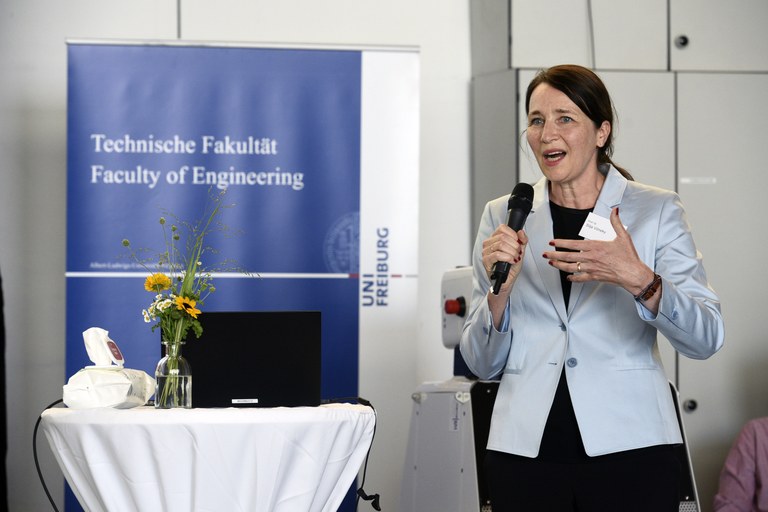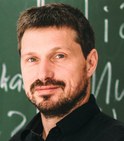Dear FRIAS Community,
After a spring and a good part of the summer characterized by a sobering, pandemic-enforced calm in Albertstraße 19, FRIAS reports back! Much has been happening in the background during and after the weeks of the lockdown – far beyond adapting our work to the Corona pandemic and helping our fellows navigate the jungle of ever-changing rules and regulations. As quite a few of you have noticed, we have successfully moved our internal events and colloquia to the virtual space (find recordings of our events in our Media Library). Now we are busy developing new formats and ideas to strengthen our community and our outreach, virtually AND in presence, under these new conditions. FRIAS is also adding new programmes to its existing funding portfolio. One of them is specifically designed to enable international researchers to flexibly work in Freiburg for a number of years and thus build long-lasting connections.
Quietly in the background, FRIAS is in the middle of the transition process from the temporary, project-funded FRIAS 2.0 to a permanently funded FRIAS 3.0 enjoying the status of a lasting integral institution of the University of Freiburg. Consider this issue of the FRIAS Express and the next ones as invitations to join us on our journey to FRIAS 3.0!
 TOP NEWS TOP NEWS
» Our Calls for Applications for the academic year 2021/22 are open!
We are happy to announce that for the academic year 2021/22 we offer a variety of programmes for researchers in all subjects, locations and career-stages:
» FRIAS COFUND Fellowship Programme
The Freiburg Institute for Advanced Studies is offering Individual FCFP fellowships, co-financed by the European Union through the Horizon 2020 research and innovation programme “Marie Skłodowska-Curie Action (COFUND)" and the State of Baden-Württemberg.
- Junior fellowships (completed PhD plus one to six years of post-doctoral experience)
- Senior fellowships (completed PhD plus a minimum of six years of post-doctoral experience or a tenured professorship or equivalent permanent position)
Applications must be submitted by September 30, 2020, 24.00 h CET
Find the Call for Applications here: https://www.frias.uni-freiburg.de/en/news/call-for-applications/frias-cofund-fellowship-programme-2021-22
» FRIAS Internal Junior and Senior Fellowships
FRIAS offers eight Internal Fellowships for researchers employed at the University of Freiburg.
Application deadline is October 31, 2020, 24.00 h CET
Find the detailed Call for Applications here: https://www.frias.uni-freiburg.de/en/news/call-for-applications/frias-internal-junior-and-senior-fellowships-2021-22
» FRIAS Research Focus
For the academic year 2021/22 FRIAS seeks to sponsor two Research Foci for groups of 3-4 professors and/or junior professors of the University of Freiburg.
Application deadline is October 31, 2020, 24.00 h CET
Find the Call for Application here: https://www.frias.uni-freiburg.de/en/news/call-for-applications/frias-forschungsschwerpunkte-2021-22
» FRIAS Project Groups
FRIAS offers funding for two project groups, consisting of teams of 2-6 researchers of the University of Freiburg and external institutions.
Application deadline is October 31, 2020, 24.00 h CET
Find the Call for Applications here: https://www.frias.uni-freiburg.de/de/aktuelles/wiss-ausschreibungen/frias-projektgruppen-2021-22
» FRIAS Junior Researcher Conferences
FRIAS offers funding for three workshops or conferences with up to 50 participants. For this format, groups of 2-5 young researchers (PhD-students, postdocs, junior professors or junior academic staff and lecturers) from all disciplines are eligible.
Application deadline is October 31, 2020, 24.00 h CET
Find the Call for Applications here: https://www.frias.uni-freiburg.de/de/aktuelles/wiss-ausschreibungen/frias-nawuko-2021-22
 LOOKING FORWARD LOOKING FORWARD
» Introducing a New Fellow Format: The Freiburg Research Collaboration Programme (FRESCO)
With the Freiburg Research Collaboration Programme (FRESCO), the University of Freiburg offers a new funding format to interlace research and researchers worldwide. The programme intends to establish long lasting, sustainable links between excellent researchers from Freiburg and high-ranking national and international colleagues. To enhance the University of Freiburg’s research profile, FRESCO aims to strengthen existing profile fields and to develop emerging fields.
The call invited Freiburg faculty to nominate top international researchers as external fellows. In order to promote the establishment of new long-term collaborations or the strengthening of existing collaborations, selected fellows will repeatedly visit their hosts in Freiburg for short stays. The 10-month fellowship can be divided into a number of visits over a period of five years. FRESCO will thus support the continuous exchange of expertise and technologies between excellent researchers.
For the first funding period 2020-25, we have received twelve nominations representing eight of the University’s profile fields. From this pool of applicants, the FRIAS Scientific Advisory Board selected five FRESCO fellows 2020-25:
- Prof. Suzanne E. Mohney, Penn State University;
Host Freiburg: Prof. Anna Fischer (ExcCluster livMatS, Functional and Bioinspired Materials)
- Prof. Onookome Okome, Department of English and Film Studies, University of Alberta;
Host Freiburg: Prof. Andreas Mehler (African Film and Cultural Studies, Comparative Area Studies)
- Professor Klaus Puettmann, Alternative Silviculture, Oregon State University;
Host Freiburg: Prof. Jürgen Bauhus (Complexity of Nature and Future Ecosystems)
- Prof. Gregg J. Suaning, Biomedical Engineering, University of Sydney;
Host Freiburg: Prof. Thomas Stieglitz (Neuroscience and Neurotechnology)
- Prof. Nektarios Tarvernarakis, Foundation for Research and Technology-Hellas (FORTH), Institute of Molecular Biology and Biotechnology, Medical School of University of Heraklion, Crete;
Host Freiburg: Prof. Ralf Baumeister (ExcCluster BIOSS/CiBSS, Biological Signalling Research/Metabolism Research)
In autumn 2020, there will be a second call for nominations. Since one of FRIAS’s core missons is to promote women in science, this call will contain a special dedication to the nomination of female researchers.
» Announcement: FRIAS Directors to Publish Volume “Jenseits von Corona”
On September 25, FRIAS Directors Bernd Kortmann and Günther Schulze will publish an edited volume offering scientific perspectives on the Corona pandemic and what the post-Corona world may look like.
The volume will contain 30 contributions in a kaleidoscope of topics, with the majority of the authors being, or having been, affiliated to FRIAS or the University of Freiburg. Among the contributors are Julika Griem (Vice-President DFG, Member of FRIAS Steering Committee), Dorothea Wagner (President of the German Science Council, former member of FRIAS Scientific Advisory Board), Eva von Contzen (ERC Starting Grant, Junior Fellow and Chair of the FRIAS Alumni Club), Lars Feld (Chair of the German Council of Economic Experts, former Rector’s Fellow at FRIAS), Andreas Vosskuhle (former President of the German Constitutional Court, Rector of U Freiburg upon the foundation of FRIAS), Jürgen Osterhammel (Distinguished Fellow FRIAS), and many other distinguished scholars.
For more information about the book and the accompanying blog, please consult the publisher’s website and the editors' introduction.
On September 29, FRIAS plans to hold an interactive virtual book launch. We will keep you informed about the event and the book on our homepage and via E-Mail.
 LOOKING BACK LOOKING BACK
» Conference: Global Perspectives on Responsible AI: An Interdisciplinary Research Symposium

On 25th and 26th of June, the FRIAS Saltus! Group “Responsible Artificial Intelligence” organised an interdisciplinary research symposium on “Global Perspectives on Responsible AI”. According to the current conditions, the conference was organized entirely in the digital space.
The symposium set out to discuss fundamental technological, philosophical, ethical, and legal challenges of AI systems for the next decade from a global and interdisciplinary perspective. Panels comprised topics like international approaches to legal frameworks, risk evaluation, the use of AI in medicine and neurotechnology, the weaponization of AI and current challenges to AI governance. For these discussions, researchers from internationally renowned institutions like MIT, Harvard, Stanford, and Columbia Universities, various Max Planck Institutes, and the London School of Economics and Political Science followed the organizers’ invitation.
But the conference did not only tackle general questions of responsible AI. It also dedicated presentations to topics most relevant in our current battle with the global pandemic. Former FRIAS guest researcher Haksoo Ko (University of Seoul) contributed a South Korean view on Covid-19, Contact Tracing, and Data Governance. Former FRIAS Project Group member Tonio Ball (University Medical Center Freiburg) offered insights into the use of AI in medicine and healthcare.
With their successful conference, FRIAS Saltus! Group once more pioneered our efforts to transfer our events to the virtual space.
» FRIAS Saltus! Group informs First Minister about Artificial Intelligence

In July, the First Minister of Baden-Württemberg Winfried Kretschmann visited the University of Freiburg to gain insight into cross-border cooperation in medicine and current research in the field of Artificial Intelligence. University of Freiburg’s Rector Professor Hans-Jochen Schiewer emphasized that as an internationally-recognized AI centre, Freiburg is distinguished by its performance, creativity, innovation, and diversity: “This is the case for research, teaching and transfer, and the performance data emphatically show it: in the field of Artificial Intelligence, we are one of the strongest publishing institutions in the whole of Europe.” Most recently this strength has been acknowledged by the inclusion of the University of Freiburg in the European Laboratory for Learning and Intelligent Systems (ELLIS).
Next to projects like the self-navigating robot “Obelix” or the “Sensorauto”, the presentations in the University’s Roboterhalle also tended to another innovative aspect of AI-research in Freiburg: As an integral part of the research programme, since 2018 the FRIAS Saltus! Group "Responsible Artificial Intelligence" has investigated normative and philosophical principles as well as the ethical, legal, and social challenges affecting how people interact with intelligent systems. Representing the Saltus! Group, Professor Silja Vöneky (International Law) and Professor Oliver Müller (Philosophy) introduced the high-ranking guests to their projects and their key research questions.
The presentations corroborated Freiburg’s leading role in AI-research, as the First Minister concluded: “I’m impressed by the advances in research into human-machine interfaces at the University of Freiburg, and how they have practical applications, for instance, in the development of robots for medicine, agriculture or people with disabilities. The University of Freiburg is helping to ensure that the Federal State of Baden-Württemberg will remain an innovator in the field of AI. With the establishment of an ELLIS unit it is working within a European network of outstanding research sites, and I am especially delighted about this.”
In the next five years, all 5 members of the unit will be invited to conduct their research and engage with the interdisciplinary FRIAS community as Rector’s fellows for up to one year each. Especially for the future use of Artificial Intelligence, the Saltus! Group’s research on the fundamental philosophical and ethical questions of Artificial Intelligence and collaborations like ELLIS are indispensable and will prove to be relevant in everyday life.
 PEOPLE AT FRIAS PEOPLE AT FRIAS
» Michael Rießler accepts full professorship at University of Eastern Finland in Joensuu
The Freiburg Institute for Advanced Studies congratulates!

Former FRIAS Fellow Michael Rießler has been appointed Professor of General Linguistics at the University of Eastern Finland in Joensuu. After completing his MA in Northern European Studies at Humboldt University Berlin and a PhD in General Linguistics at Leipzig University, Michael Rießler dedicated his Postdoc-projects to the encounter between language documentation and language technology. His projects during his FRIAS fellowships in 2014 and 2017/18 also aimed at documenting endangered languages using systematic methods. Following research stays and visting professorships at various elite institutions in Europe, Rießler now accepted his professorship in Joensuu. With his expertise, Michael Rießler will enrich the University of Eastern Finland's research profile, which focuses on Finno Ugric minority languages in the border regions towards Russia as well as General Linguistics and Computational Linguistics. Rießler plans to uphold his ties to FRIAS and will also continue his collaboration with the Department of Scandinavian Studies at the University of Freiburg.
Congratulations to Michael Rießler and good luck for his new appointment!
 LATEST PUBLICATIONS LATEST PUBLICATIONS
Harald Bauder: Urban Solidarity: Perspectives of Migration and Refugee Accommodation and Inclusion, in: Critical Sociology 2020, https://doi.org/10.1177/0896920520936332.
Marco Caracciolo: Embodiment and the Cosmic Perspective in Twentieth-Century Fiction (Routledge Studies in Twentieth-Century Literature), London 2020.
Udo Oppermann:
- Cribbs AP, Terlecki-Zaniewicz S, Philpott M, Baardman J, Ahern D, Lindow M, Obad S, Oerum H, Sampey B, Mander PK, Penn H, Wordsworth P, Bowness P, de Winther M, Prinjha RK, Feldmann M, Oppermann U. Histone H3K27me3 demethylases regulate human Th17 cell development and effector functions by impacting on metabolism. Proc Natl Acad Sci U S A. 2020 Mar 17;117(11):6056-6066. doi: 10.1073/pnas.1919893117. Epub 2020 Mar 2. PMID: 32123118; PMCID: PMC7084125.
- Thézénas ML, De Leo B, Laux-Biehlmann A, Bafligil C, Elger B, Tapmeier T, Morten K, Rahmioglu N, Dakin SG, Charles P, Martinez FE, Steers G, Fischer OM, Mueller J, Hess-Stumpp H, Steinmeyer A, Manek S, Zondervan KT, Kennedy S, Becker CM, Shang C, Zollner TM, Kessler BM, Oppermann U. Amine oxidase 3 is a novel pro-inflammatory marker of oxidative stress in peritoneal endometriosis lesions. Sci Rep. 2020 Jan 30;10(1):1495. doi: 10.1038/s41598-020-58362-3. Erratum in: Sci Rep. 2020 Mar 24;10(1):5665. PMID: 32001775; PMCID: PMC6992811.
- Guo M, Bafligil C, Tapmeier T, Hubbard C, Manek S, Shang C, Martinez FO, Schmidt N, Obendorf M, Hess-Stumpp H, Zollner TM, Kennedy S, Becker CM, Zondervan KT, Cribbs AP, Oppermann U. Mass cytometry analysis reveals a distinct immune environment in peritoneal fluid in endometriosis: a characterisation study. BMC Med. 2020 Jan 7;18(1):3. doi: 10.1186/s12916-019-1470-y. PMID:31907005; PMCID: PMC6945609.
 DIRECTOR’S CORNER DIRECTOR’S CORNER
August at FRIAS typically is very calm due to the summer holiday season. Interestingly, this August is considerably busier than in previous years, with more people taking their vacations later, and more people than usual either staying longer or arriving a little earlier than originally planned. This is a good sign for the situation at FRIAS and the overall situation here in Freiburg, which our current and new fellows and guest researchers clearly seem to judge very positively and most conducive to their personal and professional well-being. Four months after our last FRIAS Express, I am very happy to be able to say this, just as it gives me comfort and confidence that in the course of the next few weeks FRIAS will become home to about 20 new arrivals, with about the same number from February/March 2021 onwards.
Even more pleasure it gives me to share with our readers the following wonderful piece of news. For four of our FRIAS and MIASA team members, this spring and summer (weatherwise both glorious, by the way) has been, or soon will be, very special for a different reason. Yes, we are talking about new members of the human race! Confirmed so far are one safe arrival in Accra, Ghana (Awinimi Paul) and two here in Freiburg (Ben and Elma, with the latter and her proud mother having already attended our team’s spring breakfast on a brightly sunlit FRIAS terrace, upon celebrating the end of the lockdown)! Heartfelt congratulations!!
But FRIAS has also been productive in more traditional ways: despite the well-known adverse circumstances, many of our fellows managed to complete large, if not all, parts of the manuscripts and projects they wanted to work on during their fellowships. Even the directors of the Institute scored in this regard, as noted in the Express above: Social Sciences director Günther G. Schulze and my humble self edited a volume on the world after the pandemic, with thirty contributions from distinguished colleagues representing the humanities, social and behavioural sciences as well as medicine, the natural and life sciences. For about 20 of the contributors there exist close links with either FRIAS or the University of Freiburg, or both. It was amazing how quickly the people we had asked in mid-May, who are normally extremely busy, agreed AND delivered their contributions within eight weeks, so that we could submit the final version on July 27. (In fact, this was the very same day, writes the Director Humanities with a still moderately beaming face, when the manuscript of a linguistics textbook was submitted that he had been toying with since the beginning of the year.)
So, you see, even in times like these, there are many good reasons for not losing sight of the bright side of life. I wish all readers many such moments and occasions in which they can appreciate and enjoy all the large and small positive things still happening around us!
|



